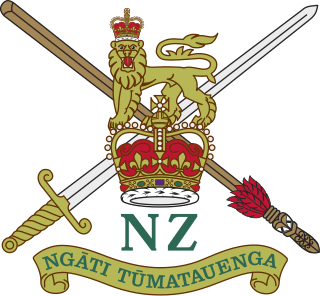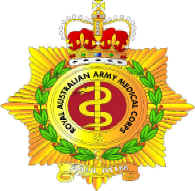
The British Armed Forces are the military forces responsible for the defence of the United Kingdom, its Overseas Territories and the Crown Dependencies. They also promote the UK's wider interests, support international peacekeeping efforts and provide humanitarian aid.

Brigade of Gurkhas is the collective name which refers to all the units in the British Army that are composed of Nepalese Gurkha soldiers. The brigade draws its heritage from Gurkha units that originally served in the British Indian Army prior to Indian independence, and prior to that served for the East India Company. The brigade includes infantry, engineering, signal, logistic and training and support units. They are known for their khukuri, a distinctive heavy knife with a curved blade, and have a reputation for being fierce and brave soldiers.

The New Zealand Army is the principal land warfare force of New Zealand, a component of the New Zealand Defence Force alongside the Royal New Zealand Navy and the Royal New Zealand Air Force.

This timeline covers the main wars, battles and engagements and related issues for the Scottish, English and British Army, from 1537 to the present. See also Timeline of British diplomatic history.

16 Air Assault Brigade Combat Team, known simply as 16 Air Assault Brigade from 1999 – 2021, is a formation of the British Army predominantly based in Colchester, Essex. It makes up the Air Assault Task Force, a battlegroup held at high readiness, and is the only brigade in the British Army focused on operating via parachute, helicopter and air-landing.

The Royal Australian Army Medical Corps (RAAMC) is the branch of the Australian Army responsible for providing medical care to Army personnel. The AAMC was formed in 1902 through the amalgamation of medical units of the various Australian colonies and was first deployed to South Africa as a small detachment of personnel supporting the Australian Commonwealth Horse during the Second Boer War. The corps has participated in every Australian Army operation since then, including wars and peacekeeping operations. The "Royal" prefix was granted in 1948.

The Malaysian Army is the land component of the Malaysian Armed Forces. Steeped in British Army traditions, the Malaysian Army does not carry the title ‘royal’ as do the Royal Malaysian Navy and the Royal Malaysian Air Force. Instead, the title is bestowed on selected army corps and regiments who have been accorded the honour by the Yang di-Pertuan Agong, who is the Supreme Commander of the Malaysian Armed Forces.

British Forces Cyprus (BFC) is the name given to the British Armed Forces stationed in the UK Sovereign Base Areas of Akrotiri and Dhekelia on the island of Cyprus and at a number of related 'retained sites' in the Republic of Cyprus. The United Kingdom retains a military presence on the island in order to keep a strategic location at the eastern end of the Mediterranean, for use as a staging point for forces sent to locations in the Middle East and Asia. BFC is a tri-service command, with all three services based on the island reporting to it.
The history of the Australian Army is the culmination of the Australian Army's predecessors and its 120-year modern history. The Army has its origins in the British Army and colonial military forces of the Australian colonies that were formed prior to the Federation of Australia. These were gradually united into federal units between 1899 and 1903; thus forming the beginning of the Australian Army. The colonial forces were combined and formed the basis of the new army, when the Commonwealth of Australia was founded on 1 January 1901. The modern history of the Army began with its founding at the start of the 20th century as the colonial armies were officially united as the Commonwealth Military Forces. In 1916 the title 'Australian Military Forces' was adopted and remained its official name until 1980, after which it became known as the Australian Army.

The 3rd Marine Logistics Group is the Logistics Combat Element (LCE) for III Marine Expeditionary Force currently headquartered on Camp Kinser, Marine Corps Base Smedley D. Butler, Okinawa, Japan. 3rd MLG provides combat service support (CSS) to III MEF units above the organic capability. CSS is the essential capabilities, functions, activities, and tasks necessary to sustain all elements of operating forces in theater at all levels of war. Combat service support includes, but is not limited, to supply, maintenance, transportation, general engineering, health services, and other services required by aviation and ground combat forces to permit those units to accomplish their missions.

The Sri Lanka Army is the oldest and largest of the Sri Lanka Armed Forces. The army was officially established as the Ceylon Army in 1949, though the army traces it's roots back in 1881 when Ceylon Light Infantry Volunteers was created; the army was renamed as the 'Sri Lanka Army' when Sri Lanka became a republic in 1972. In 2024, the Army had approximately 150,000 personnel.
Singapore has had an history of armed conflict and personnel dating to the colonial period.
The 2nd Combat Engineer Regiment (2 CER) is an Australian Army combat engineer regiment located at Gallipoli Barracks in Brisbane, Queensland. It is part of the Australian 7th Brigade, attached to Forces Command (Australia).

The 36 Engineer Regiment is a regiment of the Corps of Royal Engineers within the British Army. The regiment trace their history back to before World War II as 36 Army Engineer Regiment. The regiment today is a general support engineer regiment provided force support within 12 Engineer Group.

2nd Medical Group is a formation of the British Army under Field Army Troops. It predominantly provides deployed hospital care via 11 Multi-Role Medical Regiments. It also provides specialist medical capabilities via three Nationally Recruited Reserve Units; 306 Hospital Support Regiment, 335 Medical Evacuation Regiment and the Medical Operational Support Unit.

The page contains the current structure of the British Army. The British Army is currently being reorganised to the Future Soldier structure.
Military Hospital 175 is the central hospital for the south region of the ministry of defense, located in Ho Chi Minh City, Vietnam. It was founded in 1975 by unifying a few military medical divisions and units, most notably K116, K72, and K59, initially to serve veterans and military officers after the Vietnam war. Over the years, it has been slowly opened to the general public and now also acts as a district hospital as well as a trauma center for the civilians.

Operation Rescript was the code name for the British military operation to help tackle the COVID-19 pandemic in the United Kingdom and its Crown Dependencies between 2020 and 2022. It was described as the UK's "biggest ever homeland military operation in peacetime" by the Ministry of Defence (MOD), involving up to 23,000 personnel within a specialist task force, named the COVID Support Force (CSF). The support was given at the request of the UK government, its devolved administrations and civil authorities through the Military aid to the civil authorities (MACA) mechanism.

Operation Broadshare is the code name for the British military operation to address the COVID-19 pandemic overseas, primarily in the British Overseas Territories (BOTs) and British overseas military bases. The operation runs in parallel to a similar military operation in the United Kingdom, named Operation Rescript.
Future Soldier is a reform of the British Army resulting from the Integrated Review of Security, Defence, Development and Foreign Policy published in March 2021. The aim of the reform is to create a more lethal, agile and expeditionary force, able to fight and win wars and to operate in the grey-zone between peace and war. Future Soldier was published on 25 November 2021 and deals with the organizational changes of the British Army, with changes to personnel and equipment were set out in the Defence in a Competitive Age paper published on 22 March 2021.














